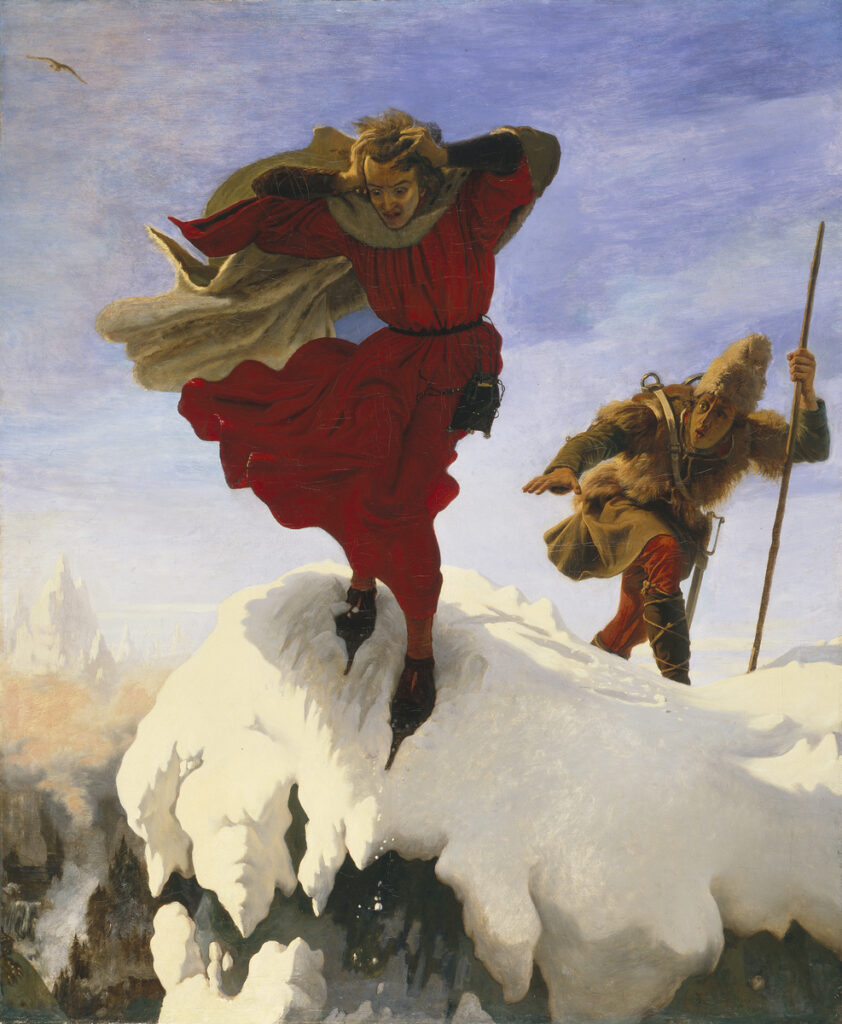There is a precipice. We are on the edge. It is either love or death.
Love
In English we refer to ‘falling’ in love. In Julius an Theone, Matthisson writes about the consequences of such a fall:
Dass uns Meere doch geschieden hätten,
Nach dem ersten Drucke deiner Hand!
Schaudernd wank ich nun am Rand
Eines Abgrunds, wo auf Dornenbetten,
Tränenlos, mit diamantnen Ketten,
Die Verzweiflung lauscht, mich zu retten!
Holde Feindin meines Friedens, beut
Mir die Schale der Vergessenheit!
If only oceans had separated us
After that first touch of your hand!
Shaking, I now totter on the rim
Of an abyss, where, on beds of thorns,
Without tears, in diamond chains,
Despair is lying in wait! To save me.
Beauteous enemy of my peace, offer
Me the chalice of forgetfulness!
Matthisson, Julius an Theone D 419
For Fellinger the experience of first love takes us to the rim of life itself. By falling in love we are plunging into life.
Die erste Liebe füllt das Herz mit Sehnen
Nach einem unbekannten Geisterlande,
Die Seele gaukelt an dem Lebensrande,
Und süße Wehmut letzet sich in Tränen.
First love fills the heart with longing
For an unknown land of spirits,
The soul hovers on the rim of life
And sweet melancholy expresses itself in tears.
Fellinger, Die erste Liebe D182
Death
Hauche milder, Abendluft,
Klage sanfter, Philomele,
Eine schöne, engelreine Seele
Schläft in dieser Gruft.
Bleich und stumm am düstern Rand
Steht der Vater mit dem Sohne
Breathe more gently, evening air,
Lament more softly, Philomel,
A beautiful, angelically pure soul
Is asleep in this grave.
Pale and silent by the bleak rim
Stands the father with his son
Grablied für die Mutter (Funeral song for a mother) D 616
Das Grab ist tief und stille
Und schauderhaft sein Rand
The grave is deep and quiet
And its rim is terrifying.
Salis-Seewis, Das Grab (The grave) D 329A D 330 D 377 D 569 D 643A
☙
Descendant of:
SPACE (location)Texts with this theme:
- Die erste Liebe, D 182 (Johann Georg Fellinger)
- Abendlied (Groß und rotentflammet), D 276 (Friedrich Leopold Graf zu Stolberg-Stolberg)
- Das Grab, D329A, D 330, D 377, D 569, D 643A (Johann Gaudenz von Salis-Seewis)
- Julius an Theone, D 419 (Friedrich von Matthisson)
- Lied (Ferne von der großen Stadt), D 483 (Caroline Pichler)
- Grablied für die Mutter, D 616 (Anonymous / Unknown writer)
- Totengräbers Heimwehe, D 842 (Jacob Nicolaus Craigher de Jachelutta)


